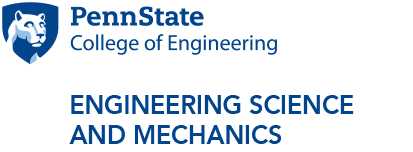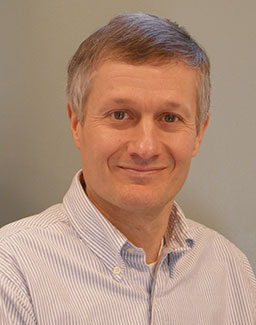Tim Davis receives Outstanding Engineering Alumni Award
2/18/2019
UNIVERSITY PARK, Pa. — Tim Davis (’86 E SC), retired executive vice president and chief technology officer for Kionix, Inc., was recently named one of 12 recipients of the 2019 Penn State Outstanding Engineering Alumni (OEA) Award.
The award, established in 1966, is the highest honor bestowed by the College of Engineering and recognizes graduates who have reached exceptional levels of professional achievement.
Growing up in State College, Pennsylvania, with a father who worked at the Penn State Applied Research Laboratory, Davis knew he would attend Penn State for engineering. What he didn’t realize when he graduated was that his engineering science degree would end up being a perfect fit for his career—and contribute to his company becoming a worldwide leader in the consumer electronics industry.
“Going into college, I struggled with which engineering discipline I wanted to study. I knew I had the science and math skills, but I also wanted a challenging program,” said Davis. “After being admitted to Schreyer Honors College, and with engineering science being the honors program for the College of Engineering, it seemed like the logical choice, especially because the program would give me exposure to numerous disciplines.”
Following graduation, Davis attended Cornell University, where he earned a Ph.D. in electrical engineering in 1993. Davis then looked for and planned to land a traditional research or academic position. However, an unexpected opportunity changed the course of his career and set him on a path that would have a significant impact on micro-electro-mechanical systems (MEMS) technology.
“Greg Galvin, a Cornell associate who had just finished his MBA, discovered that the university had intellectual property around MEMS research that it didn’t know what to do with,” said Davis. “He really wanted to start and run a company, but he needed someone to develop the technology. Although the MEMS field aligned more with my engineering science degree than with my Ph.D. work, I agreed to be his partner.”
In 1993, Davis and Galvin cofounded Kionix, with Davis assuming the role of vice president of research, to commercialize MEMS, which are miniaturized moving devices such as sensors, mirrors and actuators that are made using semiconductor manufacturing techniques. At the time, only pressure sensors existed, but Davis realized their technology was well-suited for other types of sensors like accelerometers, and Kionix set off to develop the technology and capability needed to manufacture in volume.
“During the telecommunications boom in the late 90s, we were contracted to build our first product—an array of micro-mirrors that could move in two different directions and redirect light waves emanating from a fiber optic,” said Davis. “These MEMS mirrors were deployed into internet switch boxes to help redirect fiber optic signals from one location to another.”
Kionix’s niche product was extremely successful and gained such high visibility in the market that it resulted in part of the company being purchased by Calient Networks in 2000 for $75 million.
By retaining a portion of the company’s intellectual property, Kionix built on its success to develop a new generation of 3D motion sensors, accelerometers that would eventually be used in laptop computers, gaming systems and smartphones.
“We were the first company to measure three dimensions of linear acceleration using one sensing chip,” said Davis. “The most famous or common applications of this technology are pedometry (step counting) and screen orientation, when your phone screen switches from portrait to landscape depending on how you rotate it.”
This next generation technology was adopted by major manufacturers, including Samsung, Microsoft and Nintendo, and Kionix sold more than one billion sensors, making it the third largest supplier worldwide of 3-axis MEMS accelerometers.
Kionix was fully acquired in 2009 by ROHM, a Japanese semiconductor company, for $233.5 million. Davis retired in 2016, but he remains an adviser to Kionix and is a member of its board of directors.
Although Davis says he is “very honored and humbled” to be named an OEA recipient when there are “so many deserving alumni,” he considers the success of Kionix and what it did for his employees to be his biggest accomplishment.
“I consider myself someone who just showed up to work, did the best I could every day and made the most logical engineering decisions with the information I was presented,” said Davis. “For us to be able to manufacture and sell one billion sensors with a company of only 250 people is significant, but more importantly, we were able to help our employees—people who were as dedicated and passionate as ourselves—to feed their families and share in that success. To me, that’s a real-world accomplishment that I’m most proud.”
Davis credits his engineering science degree for a large part of his career success.
“The products we developed were an amalgamation of all the sub-disciplines I was exposed to in engineering science—structures, materials, mechanics, dynamics and much more. I’m not a ‘super Ph.D.’ in any of those disciplines but each were invaluable in helping me figure out how to navigate product development, engineering and product reliability,” said Davis. “As I look back on my education at Penn State, I realize I chose the perfect program because the field I ended up being in was very multidisciplinary.”
In retirement, Davis continues to share his technical and entrepreneurial expertise with smaller companies and students.
“There’s a lot of entrepreneurial activity in technology right now, and the economic model for engineers has changed,” said Davis. “We’re going to see more startup companies hiring the types of engineers Penn State produces—ones who have multidisciplinary and interdisciplinary experience.”
Supporting that entrepreneurial activity is important to Davis.
“Graduates today have to be more adaptable because the career path they had in mind may not exist in five years. The more we can support that mindset, the more prepared graduates will be for success,” said Davis.
Davis resides in Trumansburg, New York, with his wife, Carol, and his son, Eric.
Along with the College’s other 11 OEA Award recipients, Davis will receive his award at a ceremony on April 8 at the Nittany Lion Inn on the University Park campus.




